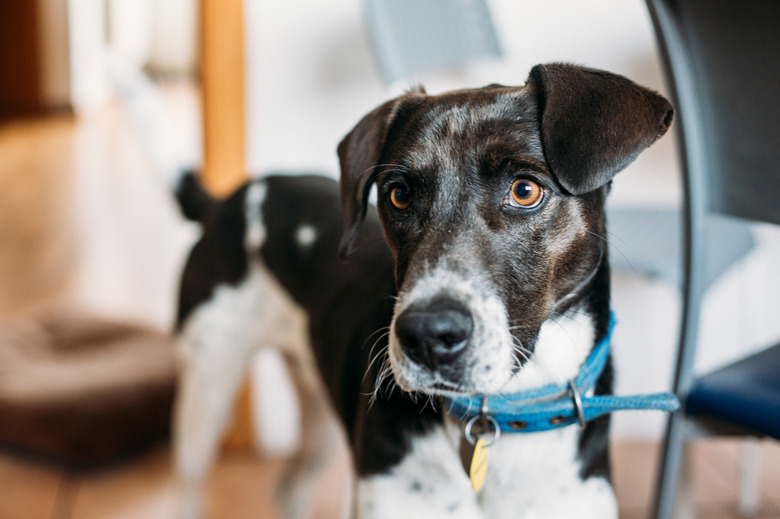How To React To A Pet That Brings Home A Dead Animal
Coming face to face with a dead baby bunny or robin as you retrieve your morning newspaper may cause you to gasp. Alas, as gross as it seems, finding this type of "present" on the patio or your doorstep is rather normal for pet owners. Indeed, it's natural for cats and dogs to bring home a dead animal or two, even though it may be an unpleasant surprise. Not only do household pets kill rodents and birds, but dogs love to roll in a deceased creature's scent on the ground.
Has your cat or dog bestowed upon you a special gift in the form of a bat or rat? Try not to panic! How to react to a pet who brings home a dead animal simply requires a calm, cool head.
Try to be understanding
Try to be understanding
Frankly, if you freak out or get angry at the sight of a dead animal, you might scare your pet. Instead, know that killing other animals, such as mice and rats is a perfectly natural type of predatory aggression seen in domestic animals. This innate predatory behavior, which is also called prey drive, compels dogs and cats to pursue their prey and then bring home the kill. In fact, a number of dog breeds were bred specifically to eradicate rodents on ships and farms, and this natural-born tendency carries over to today's pets.
Though cats may have been domesticated for thousands of years, they still have a wild side that makes catching live prey very attractive. While bird watchers and those who want to protect wildlife in general may object, there's nothing inherently wrong with a dog or cat pursuing what they think of as prey, so try not to become alarmed. Still, the responsible action to take in order to protect birds in your area is to keep your cat inside or on a leash when he's outside. Or you might dress your feline in a brightly colored collar with a bell, which signals to songbirds that danger is at hand.
Check the animal's status
Check the animal's status
Once you've collected yourself, make sure that the animal is in fact dead. Some creatures are known to play dead or may just be stunned after being roughly handled by a dog or cat, so check to see that the animal is actually deceased.
If it's still alive, decide whether it can be let go again or consider a call to animal control to remove it. Don't touch wild animals like an opossum or a rabbit and be particularly careful with bats. A dog who handles a bat in his mouth could become infected with rabies via the saliva, an open cut, or a wound.
Always offer praise
Always offer praise
The next step is to consider why your cat brought home a dead animal. Along with a natural prey drive found in cats and dogs, a pet is also showing love to their owners by bringing gifts that they killed in nature. And if your cat or dog caught a mouse in the house (and in this case, he kind of did you a favor), he may also present this special offering at your feet.
Either way, don't be angry at your pet and instead give praise. While a dead bird may sadden you (and your kids), this act of killing is in your pet's DNA, and he's treating you as a member of the family by presenting it.
Dispose of the animal
Dispose of the animal
Don't be surprised if your pet is still playing with the dead animal — batting it around the kitchen is part of the fun. Once you've removed your pet to another room, scoop up the deceased animal and then dispose of it in a secure way so that your dog or cat is unable to retrieve it. You don't want the same dead rodent or reptile showing up on your driveway repeatedly because you simply tossed it behind a bush where your pet grabbed it again.
Clean up well
Clean up well
While the risks to pet owners are low, it's important to handle dead animals carefully so as not to transmit any type of germs or disease. When disposing of your dead animal gift, always wear gloves, make sure to tie it in a bag that's well sealed, and then wash your hands thoroughly afterward. Dead farm animals may carry certain pathogens, like salmonella and E. coli, that can be spread to you if you don't take the proper precautions.
References
- American Kennel Club: Why Does My Dog Roll Around in Dead Things?
- American Kennel Club: Can My Dog Get Rabies From Bats?
- American Kennel Club: The Terrier Group – Plant Earthdog
- VCA Hospitals: Aggression in Dogs
- Centers for Disease Control and Prevention: Animal Disposal Following an Emergency
- Everhart Veterinary Medicine: Why Do Cats Bring Dead Animals to Me?
- American Humane: Indoor Cats vs. Outdoor Cats
- The Humane Society of The United States: Community Cats and Wildlife
